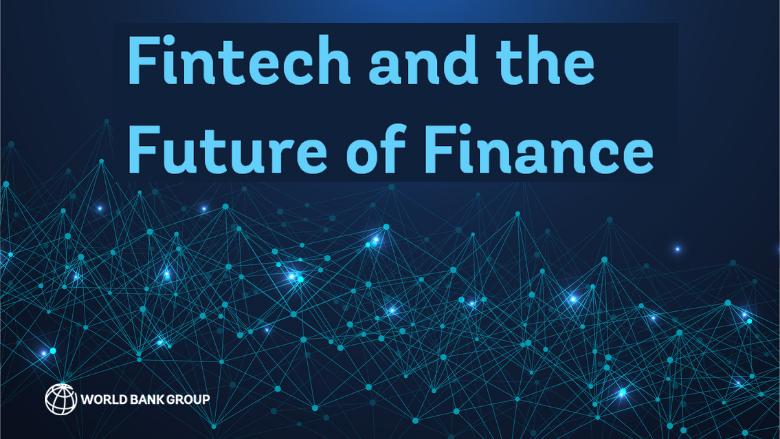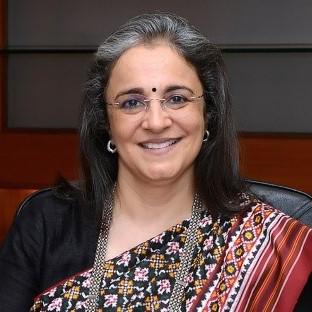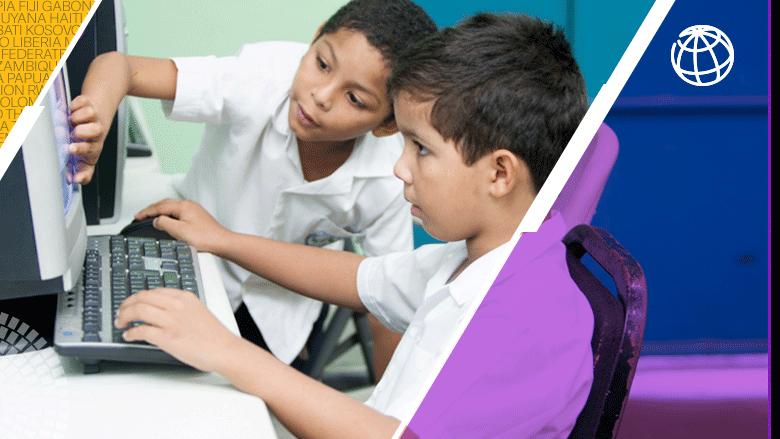Fintech and the Future of Finance: Market and Policy Implications

Fintech and the Future of Finance: Market and Policy Implications
- ABOUT THE EVENT
- AGENDA
The financial services industry is undergoing a profound transformation: rapid technological innovation is ushering in a new era of rapid changes to financial products, business models, markets, and even money.
How can the industry and policymakers foster responsible innovation to improve financial inclusion and efficiency, while mitigating new risks?
A recent World Bank report, Fintech and the Future of Finance, explores the dramatic changes in financial services provision and underscores the need for policymakers and financial regulators to adapt as fintech adoption matures and policy tradeoffs evolve.
This event will bring together a high-level panel of private and public sector representatives to share their perspectives on industry developments, regulatory responses, the impact to date, and the challenges and opportunities ahead.
00:00 OPENING REMARKS
- Jean Pesme, Global Director of Finance, Equitable Growth, Finance and Institutions Vice Presidency, World Bank
02:38 KEYNOTE SPEAKER
- Makhtar Diop, Managing Director, IFC
12:51 REMARKS AND PANEL DISCUSSION MODERATION
- Mari E. Pangestu, Managing Director, Development Policy and Partnerships, World Bank
17:54 PANEL DISCUSSION
- Madhabi Puri Buch, Chairperson, Securities and Exchange Board of India
- Koba Gvenetadze, Governor of the National Bank of Georgia
- Sheila M’Mbijjewe, Deputy Governor Central Bank of Kenya
- Jerry Ng, President Commissioner Jago, Indonesia
- Monica Brand Engel, Co-Founder and Managing Partner Quona
1:00:12 CLOSING REMARKS
- Mari E. Pangestu, Managing Director, Development Policy and Partnerships, World Bank
LEARNING RESOURCES
Read the Chat
www.worldbank.org/...
And mobile money is already transforming people’s lives. in less than 15 years, over 1.3 billion registered mobile money accounts were created, with Sub-Saharan Africa leading the way.
A study in Kenya found that women’s access to mobile money services delivered big benefits:
- It enabled women-headed households to increase savings by more 20 percent.
- It allowed 185,000 women to leave farming and develop business or retail activities.
- It helped reduce extreme poverty among women-headed households by 22 percent.
The two fundamental drivers of this wave of fintech are i) ubiquitous connectivity through mobile, internet-connected devices and communication networks, and ii) low-cost computing and data storage. Together these enable new business models for the delivery of technology, such as cloud computing.
The resulting reduced transaction costs and friction-free information flows allow for a reconfiguration of financial services value chains and product bundles. And the ability of customers and providers to access information and move funds more easily promotes the unbundling of financial services, from credit and insurance underwriting to investment robo-advisors.
In the financial services sector, risks of money laundering and other forms of illicit finance loom large.
The Financial Action Task Force (FATF) sets international standards to ensure national authorities can effectively go after illicit funds linked to cyber fraud and other serious crimes. For more information, please visit www.fatf-gafi.org/...
The World Bank helps countries build capacity to pursue the ‘dirty money’ that flows through the global financial system and is a strong voice for developing countries in global forums such as the FATF.
www.worldbank.org/...
Ms. Madhabi Puri Buch (Chairperson, Securities and Exchange Board of India)
Mr. Koba Gvenetadze (Governor, National Bank of Georgia)
Ms. Sheila M’Mbijjewe (Deputy Governor, Central Bank of Kenya)
Ms. Monica Brand Engel (Co-Founder and Managing Partner of Quona, a fintech investor in EMDEs)
Mr. Jerry Ng (Founder and Chairman of Bank Jago)
We conducted a survey under financial institutions all over the world to better understand how they think about digital transformation.
Key strategic priorities for financial firms included digitization of customer acquisition and account opening, creating new digital products, and transforming internal processes. More than 80 percent of respondents felt that the COVID-19 pandemic increased the need for fintech and digital transformation and made digitization in customer channels, product adaptation, and internal processes a strategic priority.
Respondents were concerned about operational and cyber risks increasing as a result of fintech and digital transformation. They felt that the regulatory framework and guidance for fintech and digital transformation innovation could be improved, particularly with respect to remote onboarding and account opening, use of agents or third-party channels, and automation of new products.
For the technical note, please visit:
documents.worldbank.org/...
The World Bank Group and the IMF launched the Bali Fintech Agenda in 2018, recognizing the need for regulators and policy makers to actively engage as technology transforms finance, to take advantage of new efficiencies and opportunities to improve financial inclusion, while safeguarding financial stability and consumer protection.
The World Bank Group is helping our client countries in various ways:
o The International Finance Corporation invests in private-sector fintech providers to promote the growth of responsible inclusive finance providers that serve tens of millions of customers across emerging markets.
o The World Bank is helping governments to adapt legal, regulatory, and supervisory frameworks, modernize financial infrastructures and payment systems, and ensure high standards of consumer and investor protection.
The Bali Fintech Agenda can be downloaded here:
documents.worldbank.org/...
blogs.worldbank.org/...
The Financial Action Task Force (FATF) sets international standards to ensure national authorities can effectively go after illicit funds and is closely following developments. For more information, please visit www.fatf-gafi.org/.
The World Bank helps countries build capacity to pursue the ‘dirty money’ that flows through the global financial system and is a strong voice for developing countries in global forums such as the FATF.
Enables entry of new players and new business models, which can result in more tailored products, lowering prices, and enhancing competition.
To better understand this dynamic, we conducted a survey and found that banks and fintech firms did not see each other as competitors. Respondents tended to see the greatest competitive threat coming from institutions that are similar to them. Banks mostly saw other banks and neo-banks as a bigger competitive threat than other fintech players. Fintech firms expected to compete with other new types of players such as big tech firms, platforms, or aggregators.
You can read more about the survey here:
documents.worldbank.org/...
Legal, regulatory and policy framework: This encompasses support for the review of existing frameworks and identifying potential reforms that would provide a more conducive environment for responsible innovation and broader adoption – for (e.g.) support for and design of innovation facilitators; and reforms of legal, regulatory and policy framework for removing barriers, addressing gaps and safeguarding against risks (cyber, discrimination, exclusion, breach of data and privacy; aggressive selling etc.).
Financial infrastructure: Support to country authorities spans legal and regulatory aspects to institutional arrangements and support to design and implementation of financial infrastructures underpinning efficient functioning of DFS and digital economy – for (e.g.) payment systems, credit reporting systems, asset-based lending platforms and KYC registries.
Harnessing DFS for development impact: Supporting countries to harness the potential of DFS to achieve financial inclusion; access to essential services (new billing and payment models for water, electricity etc), access to finance for MSMEs and agriculture sector; protect against risks; mobilizing financing for investment needs in the public and private sector; disaster risk management (e.g. index insurance, adaptive social protection); adoption of clean energy solutions; and improve service delivery and functioning of government (social benefit transfers, public sector salaries, tax collection).
Foster international collaboration and co-ordination: Foster development and adoption of consistent approaches to address issues that require global collaboration and co-ordination – for (e.g.) cross-border payments, global stablecoins and cross-border provision of financial services.
>> Check out Harish's blog - Fear, uncertainty and doubt: Global regulatory challenges of crypto insolvencies
blogs.worldbank.org/...
>> Fast Payments Toolkit - fastpayments.worldbank.org/
The tracker provides updates on jurisdictions around the world (by income level and geographic region, as classified by the World Bank) that have implemented fast payments and also provides information on different implementation aspects (such as technical features, technology, access rules) for each such jurisdiction.
>> Read Erik's blog, "The ascent of crypto assets: Evolution and macro-financial drivers" - cepr.org/...
About the report
visit the website to download the full report, the overview, and the executive summary in 7 languages. Learn more >















